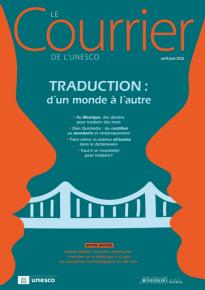فكرة
اللاجئون: حتى نقطع مع الأحكام المسبقة

يُعتقد أن كل اللاجئين الإفريقيين مُرشّحون للهجرة إلى أوروبا، وأنّ المجتمعات المضيفة معادية لهم دائمًا إذ سيتحوّلون، بالضرورة إلى منافسين للسكان المحليين في سوق الشغل. مثل هذه الأفكار المسلّم بها، والواسعة الانتشار، تفنّدها إلى حدّ كبير التحقيقات الميدانية.
الكسندر باتس
أستاذ مختص في الهجرات القسرية والشؤون الدولية بجامعة أكسفورد بالمملكة المتحدة، ومؤلف كتاب The Wealth of Refugees: How Displaced People Can Build Economies "ثروة اللاجئين: كيف يمكن للأشخاص النازحين المساهمة في تطوير الاقتصادات".
لقد بلغ عدد الأشخاص النازحين بسبب الصراعات والاضطهاد حدّا غير مسبوق منذ الحرب العالمية الثانية. غير أنه بالنّظر للوضع الحالي المُتّسم بتسييس قضايا اللجوء والهجرة، سواء في البلدان الغنية أو الفقيرة، يجد اللاجئون صعوبة متزايدة في الحصول على حماية دولية. وقد يُعزى جزء من المشكلة إلى الإعلام المُضلّل إذ تعمد وسائل الإعلام والقادة السياسيون أحيانًا إلى تشويه الصورة التي يتلقّاها الجمهور عن اللاجئين في اعتبارهم عبئا على المجتمعات المضيفة.
في كتابي "ثروة اللاجئين: كيف يمكن للأشخاص النازحين المساهمة في تطوير الاقتصادات"، اعتمدت على دراسة واسعة النّطاق أُجرٍيت في شرق إفريقيا، وشملت، بالخصوص، أكثر من 16.000 بين لاجئ وفرد من المجتمعات المحلية المضيفة داخل المخيمات والمدن في كلّ من أثيوبيا، وكينيا، وأوغندا. وقد سمحت المعطيات المُستقاة بدحض خمس أساطير متداولة على نحو واسع عن المهاجرين في إفريقيا وبيّنت أنه بإمكانهم المساهمة في تطوير بلدانهم المُضيّفة في صورة توفّر سياسات إدماجية شاملة.
التنقل - اللاجئون من إفريقيا يريدون جميعهم القدوم إلى أوروبا
في الدول الغنية، يسود الاعتقاد عامّة أن جميع اللاجئين يتمنّون الذهاب إلى أوروبا أو أمريكا الشمالية أو أستراليا. غير أن واقع اللاجئين بخصوص التنقّل مختلف تمامًا إذ أنّ %86 منهم تستضيفهم بلدان منخفضة ومتوسطة الدخل، كما أن تسعة بلدان من بين العشرة التي تضم أكبر عدد من اللاجئين هي من بلدان الجنوب.
صحيح أن عددًا كبيرا يتطلّع إلى الاستقرار في دولة غنية لكن الأغلبية تعترف بأن هذا المشروع غير واقعي. لذلك نجد أن أكثر من %95 من اللاجئين في أديس أبابا يرغبون في الاستقرار في بلد ثالث، على أنّ أكثر من النصف يدرك أن تحقيق هذا الأمل مُستبعد جدا في المستقبل القريب.
في كينيا، ورغم أن عددًا كبيرًا من اللاجئين يُغيّر مقرّ إقامته خلال نفس السنة، فإن القدر الأكبر من هذا التنقل يبقى داخليّا. أما بخصوص التنقل على الصعيد الدولي، فيتعلق أساسا بدولة أوغندا المجاورة، أو بالتنقلات المنظمة مثل العودة إلى الوطن أو الإقامة من جديد. ولا يهاجر إلى أوروبا أو غيرها من البلدان الغنية سوى جزء ضئيل فقط - أقل بكثير من %1 في السنة-.
الخلاصة: أغلبية اللاجئين يتمّ استقبالهم، وستتواصل استضافتهم، من قبل البلدان ذات الدخل الضعيف والمتوسط داخل منطقتهم الأصلية.
التماسك الاجتماعي - المجتمعات المضيفة معادية، منهجيا، للاجئين
يسود الاعتقاد بأن المجتمعات المضيفة تعتبر حضور اللاجئين عبئا عليها. إلاّ أنّه في صورة إقرار سياسات مناسبة، يُمكن تغيير النّظرة إلى اللاجئين من سلبية إلى إيجابية. ففي بعض المناطق الحدودية النائية، يمكن أن يُمثّل وجود اللاجئين والمنظمات الإنسانية أحد الأسواق القليلة ومصدر التشغيل الوحيد بدليل أنّ وجود مخيم للاجئين في كاكوما، في كينيا، يوفّر للمجتمع المحلّي منفذاً تجارياً للماشية وللحطب المعدّ للتسخين، وفرصا للعمل، فضلاً عن الوصول إلى المدارس والمستشفيات.
في جميع البلدان التي شملتها الدّراسة، ثبت لدينا أن الاتصال المباشر يلعب دورًا هامًا، إذ كلما ارتفع مستوى التفاعل بين المجموعات، كان موقف أفراد المجتمعات المضيفة أكثر إيجابية، خاصة في المدن. ويرتبط موقف السكان تجاه اللاجئين ارتباطًا وثيقًا بالموقف الذي تتبنّاه عائلاتهم وجيرانهم، وهو ما يدلّ على أن النظرة إلى اللاجئين تتكوّن داخل المحيط القريب.
الخلاصة: بالإمكان تحقيق أقصى قدر من الفوائد الاقتصادية للمجتمع المضيف، وعلى السياسات في مجال اللاجئين مساندة الجماعات المحلية المضيفة وتعزيز العلاقة بين اللاجئين والمضيفين.
الحقّ في العمل - البلدان المضيفة لا تجني شيئا من السماح للاجئين بالعمل
تمنح القوانين الدولية المتعلقة باللاجئين وبحقوق الإنسان حقوقًا اجتماعية واقتصادية للاجئين، بما في ذلك الحق في الشغل وحرية التنقل. لكن العديد من البلدان المضيفة للاجئين تحدّ من هذه الحقوق اعتقادا منها بأن السماح للاجئين بالشغل من شأنه أن يخلق توترات داخل المجتمع المضيف. ونتيجة لذلك، يُجبر اللاجئون في دول مثل كينيا وتنزانيا على البقاء طيلة سنوات في مخيمات اللاجئين دون التمكّن من الحصول على شغل. وهناك معطيات تُفيد أن لذلك تبعات سلبية على حقوق اللاجئين ورفاهيتهم، وربما أيضًا على البلدان المضيفة.
أوغندا هي إحدى الدول الأفريقية الوحيدة التي تسمح للاجئين بالشغل واختيار مقر إقامتهم. وهذه المقاربة تُوفّر مزايا ملحوظة إذ يحصل اللاجئون في أوغندا على دخل يفوق %16 دخل اللاجئين في دولة كينيا المجاورة.
وتُشير بعض المعطيات إلى أن مثل هذه السياسات تعود بالفائدة على اللاجئين وعلى مواطني الدولة المضيفة على حد السواء. ففي كمبالا، عاصمة أوغندا، تملك حوالي %21 من أسر اللاجئين شركة تُشغّل شخصًا واحدًا على الأقل، و%40 من الموظفين هم من مواطني الدولة المضيفة. وبالنسبة للعديد من الأوغنديين، يساهم اللاجئون في تنمية اقتصاد البلاد كمنتجين ومستهلكين وباعثي شركات.
الخلاصة: لا بد من تعزيز حق اللاجئين في العمل على نحو نشيط –بفضل إجراءات تحفيزية- أينما كانوا في العالم.
المدن مقابل المخيمات – وضع اللاجئين في المدن دائمًا أفضل من وضعهم في المخيّمات.
في جنوب الصحراء الأفريقية، تقيم الأغلبية الساحقة من اللاجئين الذين تمّ إحصاؤهم في المخيمات. وحسب المفوضية السامية للأمم المتحدة لشؤون اللاجئين، فإن %16 فقط من اللاجئين في كينيا يعيشون في نيروبي، و%6 من اللاجئين في أوغندا يعيشون في كمبالا، و%4 من اللاجئين في إثيوبيا يعيشون في أديس أبابا. هذا التوزيع بين الريف والمدينة يعكس قيود السلطات العامة، والاستعداد النسبي للمساعدة أو التشغيل، واختيارات اللاجئين.
غالبًا ما يكون المهاجرون المقيمون بالمدن أكبر سناً ومن الذكور، في حين أنّ سكان المخيمات أصغر سناً، عموما، ومن الإناث. ويحدث أحيانا أن تفترق عائلات اللاجئين فينتقل إلى المدن من بإمكانهم العثور على عمل، ويبقى في المخيمات أولئك الذين يحتاجون إلى المساعدة أو المعالين.
وتُظهر الدراسة التي قمنا بها في شرق إفريقيا أن اللاجئين يكسبون عيشهم بشكل أفضل حينما يكونون في المدن، لكنهم ليسوا بالضرورة سعداء أكثر، أو في صحة أفضل، أو أن تغذيتهم أحسن من أولئك الذين يعيشون في المخيمات. ثانيا، يكون موقف المجتمعات المضيفة تجاه اللاجئين الذين يعيشون في بيئة ريفية أكثر إيجابية. وأخيراً، تُوجد حركة تنقل بين المخيمات والمدن.
الخلاصة: ليس هناك فرق جوهري بين الإقامة في المناطق الحضرية أو في المناطق الريفية بالنسبة للاجئين. فكلا الخيارين مفروض وله مزاياه وعيوبه النسبية. وعلى السياسات في مجال اللاجئين أن تركز على تحسين الوصول إلى المناطق الحضرية والريفية على حد سواء.
السياسات - مساعدة اللاجئين تُمليها الاعتبارات الإنسانية فقط
غالبًا ما يُنظر إلى الإحاطة باللاجئين على أنها عمل إنساني فقط. فالقانون الدولي والدفاع عن اللاجئين يلعبان دون شك دورًا هامًا في رسم التصوّرات لحماية اللاجئين، ولكن علينا أيضًا أن نُدرك أن المساعدة المقدمة للاجئين تندرج ضمن سياق سياسي معقّد وغامض في كثير من الأحيان.
فالجانب السياسي لحقوق اللاجئين يظهر جليّا عندما نتفحّص بعمق دوافع البلدان، وخاصّة تلك الأكثر تقدمية وسخاء في مجال استقبال اللاجئين. فسياسة الاكتفاء الذاتي في أوغندا، التي أشاد بها المجتمع الدولي على نطاق واسع، يجب على سبيل المثال، أن تُوضع في سياقها التاريخي والسياسي حتى يتم فهمها. فهي ليست ابتكارًا حديثًا بل هي مقاربة تطوّرت مع مرور الزمن، بدعم من الرؤساء المتعاقبين.
الخلاصة: يجب على المنظمات الإنسانية الدولية أن تكون واعية بالسياق السياسي الذي تندرج ضمنه حماية اللاجئين. فالدفاع عن اللاجئين وحده ليس كافيًا بل يجب وضع استراتيجيات متنوّعة، وإجراءات تحفيزية من أجل تعزيز حقوق اللاجئين في مختلف البلدان.
مهاجرون أم لا جئون أم مشرّدون.
ٍجوائز نوبل الآتية من مكان آخر
قراءات ذات صلة
الهجرات الأفريقية، رسالة اليونسكو، يناير 1992
جيوسيبينا نيكوليني: "الاستقبال هو ميزة طبيعية لكلّ جزيرة"، رسالة اليونسكو، يوليو-سبتمبر 2017
اشترك في رسالة اليونسكو لمتابعة الأحداث. الاشتراك في النسخة الرقمية مجاني %100.
By Alexander Betts
Today there are more people displaced by persecution, conflict, and other crises than at any time since the Second World War – 82.4 million, with 26 million having crossed a border as refugees. However, amid the politicization of asylum and immigration, in both rich and poor countries, refugees increasingly face challenges of accessing international protection. Part of the problem stems from misinformation. The media and politicians sometimes distort public perception, portraying refugees as an inevitable burden on receiving communities.
In my recent book, The Wealth of Refugees: How Displaced People Can Build Economies, published in 2021, I argue for an evidence-based approach to refugee policy. Drawing upon extensive qualitative and quantitative research in East Africa – including an original survey of more than 16,000 refugees and host community members in camps and cities in Ethiopia, Kenya, and Uganda – I argue that given inclusive policies, it is possible for refugees to be, and be perceived to be, contributors to their host communities. I draw upon that research to challenge five popular myths about refugees in Africa.
Mobility: "Refugees in Africa will all come to Europe"
In rich regions of the world, there is a common perception that all refugees want to travel to Europe, North America, or Australasia. The reality of refugee mobility is quite different. Eighty-six per cent of refugees are hosted by low- and middle-income countries, and nine out of ten of the leading refugee countries are in the global South.
It is true that aspirations to move to rich countries are great. But many also acknowledge that this is unrealistic. For example, in Addis Ababa, more than ninety-five per cent of refugees hope to move on to a third country. However, more than half recognize that this is likely to be unrealistic in the near future.
In Kenya, although a significant number of refugees do change their residency in a given year, the majority of movement is internal. For those moving internationally, most movements are either within East Africa to neighbouring Uganda, or through organized relocations such as repatriation or resettlement. Only a tiny proportion – far below one per cent per year – are moving inter-regionally to Europe or other rich countries.
The implication is that we need to recognize that most refugees are – and will continue to be – hosted by low- and middle-income countries in their regions of origin.
Right to Work: "Host countries lose by letting refugees work"
Refugees have socio-economic rights under international refugee and human rights law. These include the right to work and freedom of movement. However, many refugee-hosting countries impose restrictions on these entitlements. They do so because they believe that allowing refugees to work will create tension with the host community. The result is that refugees in countries such as Kenya and Tanzania have to remain for many years in refugee camps, without access to employment. The evidence suggests this has negative consequences for refugees’ rights and well-being, and that it may also be bad for host countries.
Uganda is one of few African countries to allow refugees to work and choose their place of residence. This approach has significant benefits for refugees. Refugees in Uganda have sixteen per cent higher incomes than refugees in neighbouring Kenya.
There is some evidence that such policies benefit not only refugees, but also host country citizens. For example, in Kampala, the Ugandan capital, we found that some twenty-one per cent of refugee households have a business that employs at least one other person, and that forty per cent of their employees are host nationals. For many Ugandans, refugees contribute to the economy as producers, consumers, and entrepreneurs.
The implication is that we need to actively promote – and incentivize – the right and opportunity for refugees to work, no matter where they are in the world.
Cities versus camps: "Refugees are always better off in cities than in camps"
Reflecting the broader global trend in urbanization, most refugees are now in cities. However, this is not the case in sub-Saharan Africa, where the overwhelming majority of registered refugees are in camp-like settings. According to UNHCR, the UN Refugee Agency, just sixteen per cent of Kenya’s refugees are in the capital, Nairobi; six per cent of Uganda’s are in Kampala; and four per cent of Ethiopia’s are in its capital city, Addis Ababa. The urban-rural distribution reflects government restrictions, the relative availability of assistance versus employment, and the preferences of refugees.
The composition of urban and camp cohorts is generally different. Those in cities tend to be older and male, and those in camps tend to be younger and female. Sometimes refugees divide their families, with those able to work moving to the city, and those with assistance needed or care responsibilities remaining in the camps.
Our research in East Africa reveals three key insights. First, refugees earn more, own more, and work more in the city, but are not necessarily happier, healthier, or better fed than those who live in camp-like settings. Second, host communities are generally more positive towards refugees in rural than urban settings. Third, there is temporary and permanent movement between camps and cities in both directions.
The implication of these insights is that neither urban nor rural residency is inherently better for refugees than the other. Each option represents a constrained choice with relative pros and cons. Refugee policies need to focus on improving access to entitlements in both urban and rural contexts.
Politics: "Refugee assistance is entirely humanitarian"
Refugee protection and assistance are often viewed as purely humanitarian acts. International law and advocacy certainly play an important role in shaping refugee protection. However, it is also important to recognize that refugee assistance takes place in the context of complex and often ambiguous politics.
The politics of refugee rights is evident in examining what motivates even the most progressive and generous refugee-hosting countries. For example, Uganda’s widely praised self-reliance policy needs to be understood in a historical or political context. Far from being a recent creation, it has emerged over time with the support of successive presidents.
The implication is that international humanitarian organizations need to be aware of the political context in which refugee protection takes place. Rather than simply relying upon advocacy, different strategies and incentives are needed to promote refugee rights in different countries.
Alexander Betts
Professor of Forced Migration and International Affairs at the University of Oxford, United Kingdom.

In the same issue









Social Cohesion: "Host communities are inevitably hostile to refugees"
There is a common assumption that receiving communities inevitably regard the presence of refugees as a burden. Yet, given the right policies, refugees are sometimes regarded positively. In some remote border regions, the presence of refugees and humanitarian organizations may be one of very few sources of jobs and markets. For the local Turkana community of Kenya, for example, the presence of the Kakuma refugee camps offers a market for their firewood and livestock, employment opportunities, and access to schools and clinics.
Across our focus countries, we have found that what matters most to host communities is the quality of economic interaction. The people with the most positive attitudes towards refugees tend to be those who benefit economically from their presence. We have also found that contact makes a difference – higher levels of intergroup interaction are strongly associated with more positive host community attitudes, particularly in cities. Furthermore, most people’s attitudes towards refugees are strongly correlated with those held by their families and neighbours – suggesting that attitudes are formed within immediate communities.
The implication is that host communities can be welcoming towards refugees, and there are policies that can be adopted to strengthen inclusion. Put simply, refugee policies also need to support host communities, and the relationship between refugees and hosts.